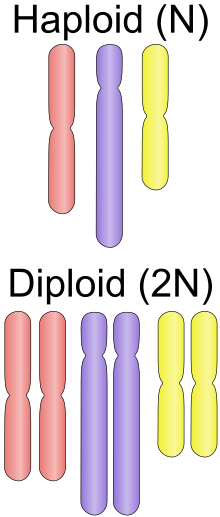Polyploidy is a condition in which the cells of an organism have more than two paired sets of (homologous) chromosomes. Most species whose cells have nuclei...
82 KB (8,887 words) - 21:10, 25 October 2024
Ploidy (section Polyploidy)
all grasses are polyploid. Many animals are uniformly diploid, though polyploidy is common in invertebrates, reptiles, and amphibians. In some species...
54 KB (6,129 words) - 11:23, 20 October 2024
Rosa canina (redirect from Permanent odd polyploidy)
meiosis which is sometimes called permanent odd polyploidy, although it can also occur with even polyploidy (e.g. in tetraploids or hexaploids). Regardless...
22 KB (2,494 words) - 07:03, 16 October 2024
Plant evolution (section Polyploidy)
asexually much more easily than most animals. They are also capable of polyploidy – where more than two chromosome sets are inherited from the parents....
16 KB (1,784 words) - 09:44, 9 April 2024
investigate the origin of a peculiar genetic component in Sequoioideae, the polyploidy of Sequoia—and generated a notable exception that calls into question...
18 KB (1,731 words) - 18:53, 2 November 2024
Speciation (section Speciation via polyploidy)
ongoing discussion. Rapid sympatric speciation can take place through polyploidy, such as by doubling of chromosome number; the result is progeny which...
77 KB (8,192 words) - 07:41, 2 November 2024
lamarckiana, was central to early genetics research into mutationism and polyploidy. It is also more occasionally done in the livestock and pet trades; some...
79 KB (8,075 words) - 19:52, 18 September 2024
gene transfer; new species can arise rapidly through hybridisation and polyploidy; and species may become extinct for a variety of reasons. Viruses are...
103 KB (10,535 words) - 15:00, 10 October 2024
1920s, that wheat was divided into 3 ploidy levels. As with many grasses, polyploidy is common in wheat. There are two wild diploid (non-polyploid) wheats...
33 KB (2,910 words) - 22:57, 15 July 2024
Gene duplication (section Polyploidy)
include ectopic recombination, retrotransposition event, aneuploidy, polyploidy, and replication slippage. Duplications arise from an event termed unequal...
34 KB (3,683 words) - 02:08, 23 October 2024








